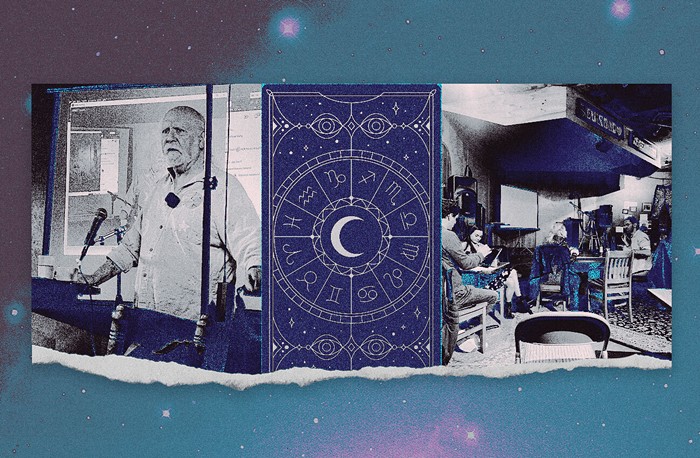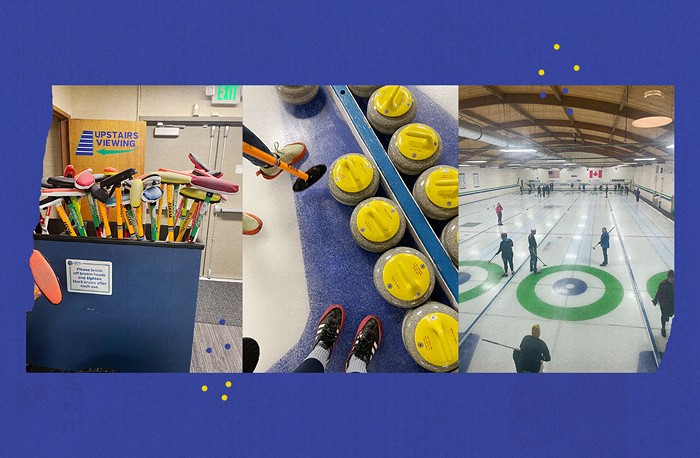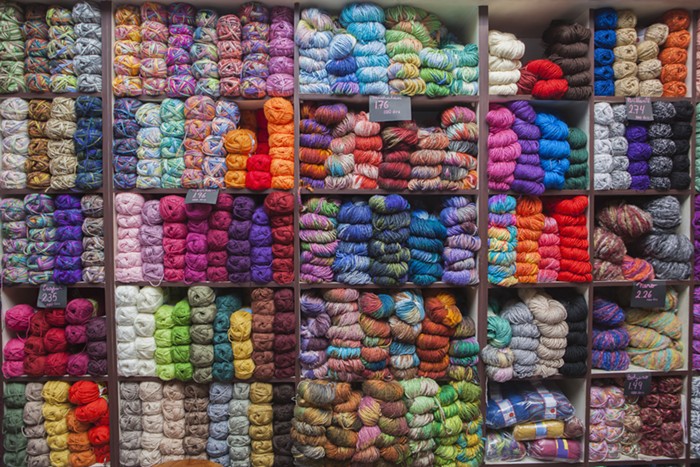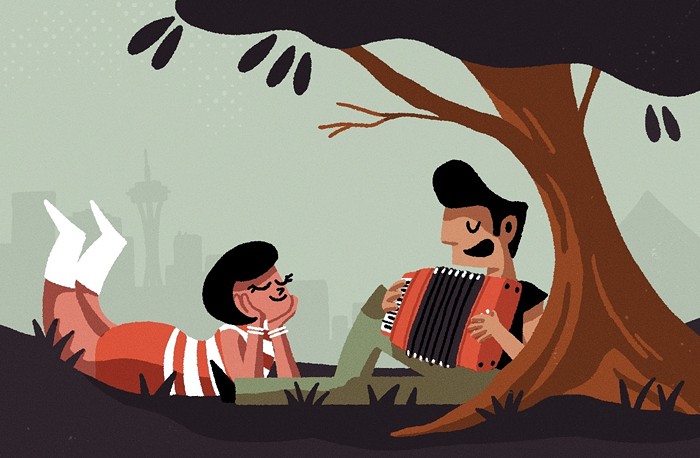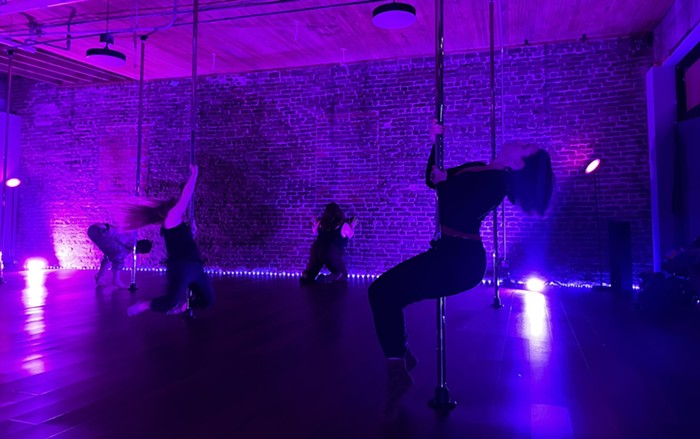Sheets of late-September rain pounded on the windshield of Emily Dean’s 2000 GMC Sierra. In the cab, safe from the storm outside, I sat in a cloud of wet dog smell. Pet hair coated the seats, clogging every crevice, dusting the floor, the door handles. A tangle of leashes and a ring so full of house keys it must have weighed two pounds rested between the seats. A small, wiry-haired white dog, Peanut, squirmed on my lap. Back in the covered truck bed, several other dogs waited patiently. They knew they weren’t at their destination yet.
This was their daily pilgrimage to the promised land: the Magnuson Off-Leash Dog Park. Dean was their shepherd, their dog walker. She made this trek—picking up dogs around the city, navigating streets through muscle memory like a London cabbie—two times a day with two different packs of around 10 dogs. She’s been doing this off and on for 27 years and doing it consistently with her company, Seattle Walk Stars, for nine.
The Magnuson dog park is the largest and most widely used dog park in Seattle. With approximately nine acres of off-leash terrain and the only waterfront access for dogs in a city where dogs outnumber children, Magnuson is a haven for dogs, dog-lovers, and dog walkers. The winding, gravelly park is its own little world, a dog-centric microcosm in dog-obsessed Seattle.
For my latest exploration into Seattle subcultures, I joined Dean and her pack for a first-hand look at Seattle’s dog culture through the eyes of its dog walkers. As someone who is not a dog person, I felt like an alien in this world.
Emily Keeps It Wild
Dean said she thought about deep-cleaning her truck before my visit, and then she thought better of it. What is the use of a deep clean when you’re a dog walker? Usually, when she has more small dogs in her pack—and doesn’t have a journalist tagging along—they sit in a heap on the passenger seat. On a day like today, there’s no masking the mix of mud and wet dog smell—cleaning is futile.
Plus, she didn’t care about dirt. When Dean was younger and living on a barge in Ballard, she slept in a bed with her dogs, unbothered by the grit they tracked between the sheets. She told her boyfriend at the time it was “like sleeping on the beach.”
This laid-back attitude and love of dogs made her perfect for dog walking, she explained as she picked up dogs from Shoreline to Green Lake and then over in Wedgwood, squeezing them into the bespoke dog-sized hatch on her truck’s covered bed. As she picked them up, she crossed out their names on the back of an envelope. First Palmer, then Mar Mar Superstar, then Truffles, and so on.
“Even if I didn’t have to work—like someday if I retire—I will do this even when I don’t have to,” Dean said. “I just love it.”
I doubt she’ll retire. She’s aggressively entrepreneurial. She also has a granola business. On the drive, she told me her idea of creating a pop-up pickleball business she likened to those Spirit of Halloween stores. In the past, when she first became a mom, she thought she’d swap packs of dogs for packs of kids and start a daycare.
But, she loves being with the dogs. They have their own personalities and quirks, and they “let you keep your thoughts in your own head,” Dean said. Kids don’t let you do that. Dean doesn’t like working with people.
“It’s so good when it’s just you and the dogs,” Dean said.
She first started dog walking in 1996, back when it wasn’t really a thing. She’d have to explain what it was to people. Dog culture has changed a lot in the nearly 30 years Dean’s been in the game. Now, dogs are more a part of the family for people.
“People have the money to spend, and they’re spoiling their dogs,” Dean said.
Sending your dog on an hour-long trip to the dog park with Seattle Walk Stars costs $35 per day. Dean is fully booked most days, which means she has anywhere from 10 to 12 dogs per park trip. The Magnuson Dog Walkers Association limits dog walkers to 10 dogs, but sometimes Dean fudges it.
"I like to keep it wild," she said. Her own dogs aren’t trained, and she’ll be damned if she trains the packs she walks. "I want to entertain the dogs. We’re more like Vegas rather than a business trip."
At the Dog Park

We pulled into the dog park after an hour-and-a-half of driving around the city picking up dogs. The rain had sputtered out.
Dean pulled on a fanny pack stuffed with poop bags and treats. She armed herself with leashes and went to let the dogs out of the truck, one by one. The dogs—Eno, who looked like a shrunken-down husky; Cookie, sleek and rust-colored; Poppy, a tall, melancholy black dog, etc.—squeezed under Truffles, a white great pyrenees, to the exit. Dean clipped each one to a leash as they clambered out of the truck. As soon as their paws hit gravel, they started pissing.
When the pack entered the actual dog park and Dean unclipped them, they scattered.
“This is the hard part because everybody goes poop,” Dean said. “It’s like that game ‘concentration.’”
While Dean picked up poop pile after poop pile, a passing dog walker checked in about Dean’s son. They chatted from 15 feet away from each other.
Dean, despite her self-described preference for dogs over people, has relationships with her fellow dog walkers.
“The working relationship between dog walkers is a weird thing,” Liza White, owner of Four Legged Friends Seattle, told me. “Think bumble bees versus honey bees; we work alongside each other, but we work alone.”
The dog park is not without its dramas.
The dog walkers, who visit the park multiple times a day most days of the week, feel a certain ownership over the park. The Magnuson Off-Leash Group (MOLG) organizes work parties for dog walkers to clean up and tend to the land. However, according to Dean, the person who ran MOLG made life miserable for the dog walkers, getting on people for not following the rules.
“The power got to her head,” Dean said. “She was creating way more problems than making solutions by being all up in everyone’s business.”
A competing group of dog walkers peeled off from MOLG and created Magnuson Off-Leash Dogwalkers Association (MODA), which pretty much does the same thing but without the drama. MODA has a committee of five dog walkers that makes decisions about advocacy and maintenance. White writes the newsletter.
Most dog walkers are congenial with each other, though some are actually friends.
“People get together,” White said. “A couple of dog walkers are in bands, so people will go and hear them play.”
Max Rose, the owner of Mr. Pups Pet Care, started his business while he was in college. He and I found out we were in the same University of Washington English class about Mark Z. Danielewski's experimental book, House of Leaves.
“I loved that book,” Rose said. “Actually, Tim over there with the pink bandana”—Rose pointed to a dog walker across the park—“that’s their favorite book. That’s how we first became friends.”
Rose already has four employees. Two of them are friends he made while at the dog park. One of those people happens to be dating Tim. (“You’ll absolutely see them smooching together in the park,” he said.) Rose’s other employees are his friend from high school and his girlfriend. Those three all live together.
“Obviously, when someone loves dogs it makes me like them,” Rose said.
For the Love of Dogs

Every day for 23 years, Joe Hurd leads his dog pack through the nearly nine-acre park to its terminus at the shore of Lake Washington. Once there, Hurd strips down and, regardless of the weather or the time of year, he’ll swim. His pack follows him, trailing behind him in the water.
I stopped Hurd as Dean and I walked through the park. I wanted him to tell me more about swimming with his dogs. Describe it to me, I implored.
“I just go in the lake and I throw balls and swim with them,” Hurd said. “I can’t really describe it much more than that.”
His business, Red Dog, Blue Dog, doesn’t have a website. He doesn’t give out business cards, either. Taciturn and solitary, Hurd is here for the dogs.
“Being around dogs and so much love, my day is full of enjoyment,” Hurd said.
It’s the same feeling for all of the dog walkers I spoke to.
“I just love them,” White said. “I feel like dogs are people. They’re just dogs and also a type of person. I feel like we have a good relationship and friendship.”
Rose feels like he operates more like a dog than a person.
“My ADHD is so bad I feel like a dog a lot of the time,” Rose said.
He elaborated: “I’m trying to live a good life under circumstances I can’t always control. The one thing I can control is I get to be at the dog park every day. It’s the one place I’m not stressed out. It’s the place where I feel like myself.”
He estimated he’s been to the dog park every day for eight years.
Dog City

The ecosystem of the dog parks consists of the dogs, the dog walkers, and the public.
The public ranges from people who regularly take their dogs to the park to the people Dean refers to as “tourists,” or people who only come to the park “on three-day weekends.” She says they’re the type who will set up picnics and cause chaos among the dogs.
Rose said he could “write a book about dog park errors.”
Mostly, though, it’s just a place where people who care about their dogs are trying to give them a life they can’t get all the time in a city.
“It takes really highly adept dog people to have a dog live a healthy, happy, stress-free life in an urban setting,” Rose said.
While spending some firsthand time with these dog walkers, I realized the activity I was participating in for this column wasn’t dog walking, but rather learning to have grace for Seattle’s dog culture.
I have to admit that living among dogs in the city soured my opinion of them. Watching Cal Anderson Park go from a place for people to an unsanctioned off-leash dog park taken over by a guerrilla group of dog owners made me seethe. Just because you chose to have a dog doesn’t mean it gets priority in a shared space, I felt.
Additionally, when I moved into a shared house, one of my roommates, who also happens to be my best friend, asked if she could get a dog. It would help her with some emotional stuff. And the dog, Murphy, a small tawny mutt with floppy ears, did help. My friend was so much happier with her around.
Murphy and I were not fast friends. I thought she was cute, sure. She just had so much energy. Murphy and the fact that she was more needy than my cat (who I viewed as perfect in spite of how he meowed incessantly to go outside most evenings) frustrated me. In a lot of ways, I was uncharitable in my impatience with the growing pains of a newly-adopted dog. Though, she did pee on my bed twice, so that didn’t help things.
A few months after Murphy came into our lives, my friend took her to the dog park. I tagged along. I was skeptical, but the dog park charmed me with its old people walking their dogs, its dogs and owners who looked identical, and its dog walkers with knots of leashes strapped across their chests strolling in front of entire packs.
Murphy went crazy. She sprinted around dogs twice her size, egging them on, enticing them to chase her. Her personality shone in a light I’d never seen. She dipped her toe beans into the water. She bit the waves, enticed by the light refracting off of them. Maybe she was okay after all. Maybe, like the internet says, all dogs are good dogs. Maybe.
Any ideas on which Seattle subculture I should explore next? Want me to tag along with you on your favorite hobby or pastime? Send me tips at playdate@thestranger.com.


